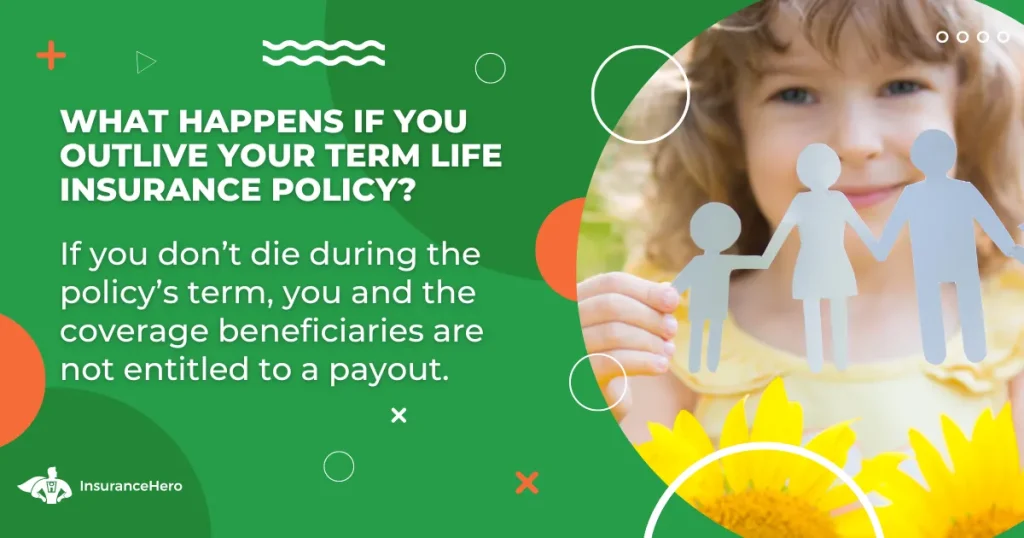What Happens If You Outlive Term Life Insurance?

Buying proper coverage can save you a lot of stress in the future. But what happens once you’ve reached the end of your policy, and what happens if you outlive term life insurance?
A term life insurance policy is one of the most popular types of life insurance in the UK. The purpose of this insurance is to secure your loved ones’ financial stability in case of your death.
By paying monthly premiums for a specified period, you can leave your family with a payout that can serve as an inheritance, can cover some substantial financial obligations, like mortgage payments, or be used to pay for living expenses, etc.
But, you may be wondering, how does life insurance work if I don’t die? What happens with all of the money you’ve been paying for years after your policy ends? Furthermore, what happens when life insurance expires?
Compare UK Term Life Providers ⏱ Takes About 60 Seconds.

Term Life Insurance
Term life insurance is one of the simplest types of coverage. The policy can cover you for 10 to 30 years, during which, in the event of your passing, your beneficiaries will receive the payout. This is provided you’ve been paying the monthly premiums on time.
There are three main types of term life coverage: Level-term life insurance, Decreasing term life insurance, and Increasing term life insurance.
Level-term life insurance offers fixed premiums and a payout that stays the same throughout the policy’s term. This means that from the beginning, you clearly understand what sum will be paid out to your family after your death.
If you wish to benefit from a more flexible option, you can purchase a Decreasing term life coverage. This cover can secure a substantial financial obligation, like a mortgage.
During the policy’s term, the payout decreases, so the closer you are to the end of the policy, the less money your family will receive if you die during its term.
Those who want their insurance to keep up with inflation will be interested in increasing term life insurance. As the name suggests, this coverage helps protect your family with a payout that increases over time.
The policy is less common than the two mentioned above due to its higher cost. Still, it might be a valuable option to ensure your loved ones receive substantial financial support that is not reduced by inflation.
Term life insurance differs from Whole life insurance, which provides coverage until the day you die. Term life insurance can protect you for an established period, after which the policy expires, and the coverage ends.
But what happens with your premiums after this occurs?
How Does Life Insurance Work If You Don’t Die During Its Term?
You might be wondering, what happens if I outlive my life insurance policy? The answer to that question is, in most cases, very simple.
Term life insurance ceases to apply once you meet the end of its term. This means that if you outlive your insurance, you’re essentially free from making any monthly payments, but you also have no coverage (if you haven’t decided on renewable insurance).
If you don’t die during the policy’s term, you and the coverage beneficiaries are not entitled to the payout.
Essentially, life insurance serves as a safety net that offers you (or, in this instance, your family) support in the most vulnerable moments of your life.
If you live longer than what your term life insurance covers, the money you paid in monthly premiums will be treated as the insurance company’s profit.
That is the risk you are facing when purchasing term life insurance to minimise the other risks, like leaving your loved ones without any protection after your death.

When Does the Term On Your Life Insurance End?
The term on your life insurance policy ends once the period for which you were insured has ended. If you are insured for ten years, your policy’s term will expire after ten years.
If you pass away during this time, the policy beneficiaries can make a claim. If that doesn’t happen, your policy will expire, and you can purchase new coverage.
What Happens If You Outlive Your Term Life Insurance?
If you outlive your insurance coverage, you may choose to do the following:
Don’t Take Any Action
After your policy expires, you’re not required to take any action. This means the policy’s conditions have been met, and you and the insurance company are now free of any obligations to each other.
Renew The Policy
You may be able to renew your policy the moment it ends. However, you’ll likely be obligated to pay higher premiums because you’re older and potentially more prone to developing various illnesses, which increases the insurer’s risk.
After you renew your term life insurance for another period, you can rest assured that your family will receive financial compensation in case of your death within the policy’s term.
Buy New Policy
You can also choose to purchase different types of insurance. For example, you may be inclined to buy Whole Life insurance, which will cover you for the rest of your life.
You may also choose a different Term life insurance policy or add additional benefits and policies, such as critical illness coverage.
Under a new policy, you may need to undergo a medical examination as part of your application. Medical underwriting will determine the amount of your insurance instalments.
When your previous Term life insurance ends, it is a good time to reevaluate your needs and life circumstances. It may turn out that buying a new policy is the best course of action, as you may need more or less coverage than before.
Finding new insurance can be a challenge in today’s saturated market.
To make your life easier, you can compare plans from the leading life insurance companies in the UK with Insurance Hero.
This way, you’ll gain access to all the relevant information about various plans and companies, which will help you make the best decision regarding your financial future.
Life Insurance That Pays Out at the End of Term
As mentioned before, in most cases, your Term life insurance won’t pay out once the policy expires. If you want to ensure the payout is guaranteed, you can opt for Whole life insurance, which will pay out after your death.
Another option is to buy a Return of Premium (ROP) term insurance. This life insurance policy pays out at the end of the term, offering a refund of your premiums if you outlive the policy.
It’s a solid strategy to make sure the money you’re paying for your insurance will come back to you, but it’s worth noting that ROP term insurance tends to be significantly pricier than standard term life insurance.
ROP policies are not widely available, as not many companies offer them. But if you’re determined to ensure that the money you’re paying in monthly premiums will be returned to you once the policy’s term is over, this matter may be worth looking into.
Do You Still Need Life Insurance Once Your Policy Ends?
Whether you need to renew or buy a new insurance policy depends on your circumstances. Once your policy expires, you’re essentially left without coverage.
For example, you might be content with that state of affairs when a term life insurance policy was purchased as collateral to a mortgage. Since you’ve paid off your mortgage, there is no need to have life insurance in place.
If you want to enjoy the peace of mind that a life policy can offer, renewing or buying a new life insurance policy is a good idea.
This way, if anything unexpected happens to you, you’re leaving your family with a financial cushion, which can help them cover the costs of the funeral, living expenses, or education.
It’s best to assess all the options before making such an important decision. Find the best insurance plans with Insurance Hero – Experts on the insurance market.
Contact us to receive all the essential information regarding the insurance plans you may benefit from.
What Happens If You Outlive Term Life Insurance? Final Thoughts
Life insurance is a great way to take care of your loved ones even when you’re no longer with them. If you want to ensure they receive financial support after your passing, investing in term or Whole life insurance is a good way to do so.
If you outlive your life insurance policy, in the majority of cases, it means the beneficiaries of the policy don’t qualify for the payout.
So, if you have ever found yourself typing “return of premium life insurance UK” into a browser, now you have the answer to your question.
Only if you purchased a Return of Premium term insurance policy can you count on a refund when it expires.
In other instances, it may be beneficial to reconsider the insurance altogether or invest in a new policy.
FAQs
At what age should you stop paying for term life insurance?
In most cases, it is advisable to pay your insurance premiums until the policy expires. This way, the policy actually protects your family, and you’re not at risk of getting your policy claim declined due to irregular or suspended payments.
The older you are, the more expensive the life insurance plans available for you to purchase; therefore, it might be a better solution to resign from life insurance at the age of 70 and above.
This will, of course, depend on your individual needs and circumstances, so it’s best to consult an insurance agent or financial advisor before making any decisions.
Can you borrow from a term life insurance policy?
Since Term life insurance doesn’t have a cash value account, it is impossible to borrow against it. This action is reserved for permanent life insurance policies, like Whole Life insurance.
Steve Case is a seasoned professional in the UK financial services and insurance industry, with over twenty years of experience. At Insurance Hero, Steve is known for his ability to simplify complex insurance topics, making them accessible to a broad audience. His focus on clear, practical advice and customer service excellence has established him as a respected leader in the field.




